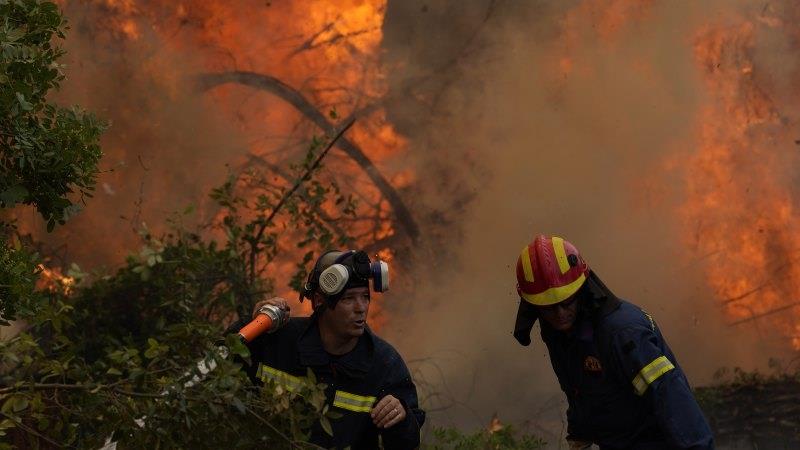Calls to abandon coal have been renewed as world leaders respond to the new United Nations climate report that warns the world remains on track for devastating global warming this century.
British Prime Minister Boris Johnson, whose government will host the November COP26 climate talks in Glasgow, described the report by the UN’s Intergovernmental Panel on Climate Change (IPCC) as “sobering reading” and said he hoped it spurred governments to greater action before the meeting.
Firefighters battle blazes in Greece on Monday, during heatwaves exacerbated by extreme heat.Credit:AP
“We know what must be done to limit global warming – consign coal to history and shift to clean energy sources, protect nature and provide climate finance for countries on the frontline,” he said.
Nonetheless, Britain’s Labour Party criticised Mr Johnson’s government saying its target of reducing the country’s carbon emissions by 68 per cent of 1990 levels by 2030 was not ambitious enough.
The report, which confirmed human activity is “unequivocally” making the world warmer at a rate not seen in at least the past 2000 years, will be central to climate negotiations in Glasgow.
United States climate envoy John Kerry described the report as “harrowing”.
“All major economies must commit to aggressive climate action during this critical decade,” he said. “It’s the only way to put us on a credible track to global net zero emissions by mid-century. We can get to the low-carbon economy we urgently need, but time is not on our side.”
US Secretary of State Antony Blinken said it was essential that all countries “do their part this critical decade” to keep Paris goals within reach.
“This is why the United States has committed to a 50 to 52 per cent reduction in emissions from 2005 levels in 2030 and is marshalling the entire federal government to tackle the climate crisis.”
French President Emmanuel Macron said via Twitter that the “time for outrage” was over and that leaders should sign a climate deal in Glasgow that matched the urgency of the problem.
Prime Minister Scott Morrison said the report reaffirmed his view that the federal government’s approach to drive down emissions by supporting clean energy technology development was a suitable policy option for Australia and the world.
He did not say if Australia would update its ambition to reduce carbon emissions by 26 to 28 per cent of 2005 levels before the Glasgow talks, but said that having already reduced emissions by 20 per cent Australia had already demonstrated that it was part of the solution.
“Australia’s record of reducing emissions stands above those who are claiming to achieve bigger things in the future, but haven’t achieved it to date,” he said.
Climate scientist Bill Hare, the director of Climate Action Tracker, which analyses global climate policy and provides data to several national governments, said that by any global or domestic analysis Australia lagged on emission reductions.
Though the federal government has stated it would “preferably” like to reach net zero emissions by 2050, the meeting in Glasgow would focus on how to reach a pathway to that target. Dr Hare said to achieve that the world would need to halve emissions by 2030, and developed nations such as Australia would come under pressure to do more than that.
Mr Morrison noted that China’s emissions were greater than the combined output of the world’s wealthier nations and that no solution to global warming could be achieved without that nation’s efforts.
Though its coal use is still rising China has stated goals to halving its emissions peak by 2030 and to reach net zero by 2060.
Get a note direct from our foreign correspondents on what’s making headlines around the world. Sign up for the weekly What in the World newsletter here.
Most Viewed in Environment
From our partners
Source: Read Full Article






